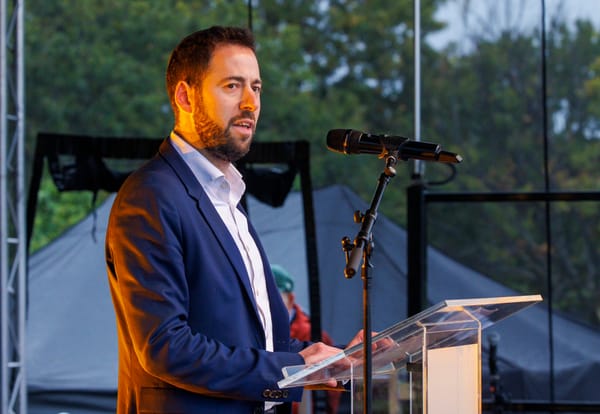Against destiny
On not doing what you’re supposed to.

This Tuesday, 15 April, was 36 years since the Hillsborough Disaster, in which 97 Liverpool fans were killed – that day and afterwards – by the gross negligence of the South Yorkshire police. In the following hours and days, the police lied to push blame onto the victims and other crowd members. Their lies were published by The Sun under the headline “THE TRUTH”.
My colleague Karl Hansen wrote for Tribune about Labour’s failure to deliver its promised “Hillsborough Law” – reiterated as recently as last year – by this anniversary. (The law would require state actors to engage honestly and cooperatively with ongoing investigations – one of those demands it’s amazing to realise is necessary, let alone contentious.) In his introduction, Karl observed that the hostility directed at the people of Liverpool after the disaster was a response to “the refusal of the bereaved to keep calm and carry on in the face of injustice.” The assumption was that working-class victims of state failures like this should mourn, but ultimately accept their predetermined powerlessness. “It is precisely because Hillsborough families sought to channel their grief to disrupt and transform the institutions responsible that their campaign was so maligned.”
From Wednesday, another story dominated the British headlines: the UK supreme court’s ruling that trans women are not protected from discrimination as women in the Equalities Act 2010. Some have pointed out that the court can only interpret the law as it’s written. Others have raised concerns about the process of the case, specifically the absence of testimony from trans people. These questions aside, concern arguably lies less with the decision and more with what the government and the anti-trans movement will do with it. No ruling of this scale is made in a political vacuum. If it could prompt steps to better protect trans people in law – as other decisions have prompted legal reform – trans people and their friends and family members might be less worried. But Britain’s public sphere has been a place of rising anti-trans sentiment for years.
In 2022, Naomi Cohen wrote for Vashti about the intersection of transphobia and antisemitism. The early-20th-century views and practices of Magnus Hirschfield, a German-Jewish pioneer in trans healthcare, she noted, were perceived by antisemites at the time as “a pernicious arm of the Jewish conspiracy aimed at spreading sexual degeneracy in order to undermine the health of the German nation.” Sasha Baker has also written for Vashti on the methodological parallels between Zionism and trans-exclusionary feminism, specifically the adoption of liberationist language in pursuit of goals that actually hurt vulnerable people. Given most Jews are Zionists, these arguments – that anti-trans politics recalls historic antisemitism, and that Zionism has a relationship with anti-trans politics – should contradict each other. That contradiction reflects the deeper paradox created by believing that Zionism is inherent to Judaism – by collapsing together an ideology that has proved repressive, and dependent on alliances with right-wing power, and a religion that has been subject to so much violence and hate.
When I read about the supreme court’s decision, it struck me that the debate over who qualifies as a “real woman” has a parallel in this other debate over Zionism, which could be understood as a debate over who qualifies as a “real Jew”. That debate is historic, of course; older subjects include converts, patrilineal Jews, secular Jews. But its most recent iteration polices views on Israel. Sometimes the rules are made explicit. Former US ambassador to Israel David Friedman announced, in October 2023, that any American Jew who attended a rally by US-based anti-occupation Jewish organisation If Not Now was “not a Jew”. People who claim that anti-Zionism is antisemitism, or that “Zionism is an essential part of Jewish identity”, imply the same.
The motivating idea here is exposing and removing an internal threat, either by enforced “normalcy” or ostracisation. Anti-Zionist Jews are expected to fall in line behind Israel or accept a position as “un-Jews”. Trans people are expected to accept their “deviant” status. Working-class people are expected to accept themselves as victims of state violence, and our leaders as consequence-immune. These things are considered destiny.
I initially expected to write this Pickle about the 36 members of the Board of Deputies who broke ranks to criticise Israel’s actions in a letter to the Financial Times. “Hundreds and hundreds more Palestinians have been killed,” they wrote; “food, fuel and medical supplies have once again been blocked from entering Gaza; and we are back in a brutal war where the killing of 15 paramedics and their burial in a mass grave is again possible and risks being normal.” People on the left will find plenty to criticise in this letter, not least its delayed arrival. But its existence is proof that the way things are, or have been, is not destiny. Destiny is something we decide.▼
Francesca Newton is an editor at Vashti.





